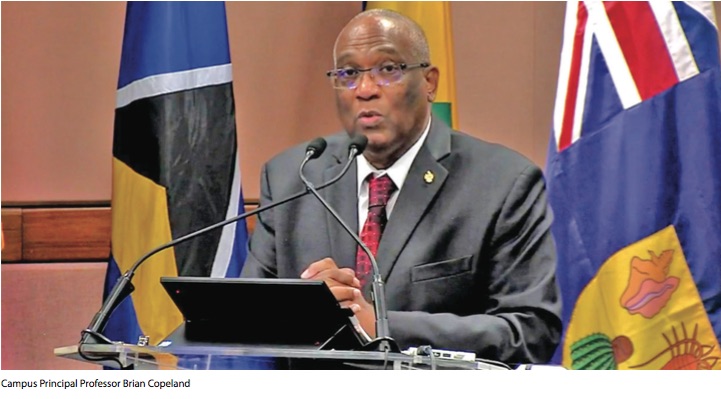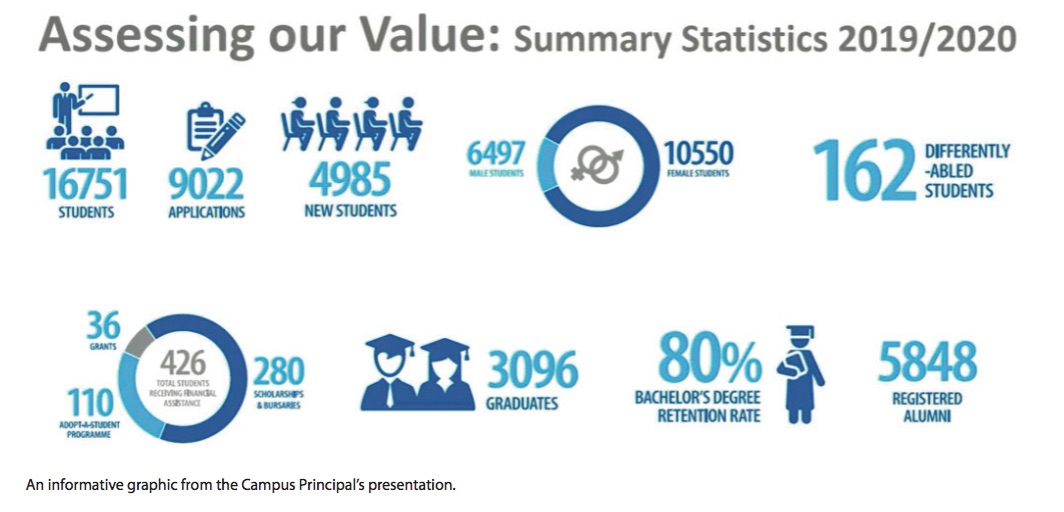Campus Council meeting addresses purpose, governance in a post-COVID world

"Reflect, review and build that university of tomorrow." That was how St Augustine Campus Principal Professor Brian Copeland described the goal of The UWI in his presentation at the open session of the 2021 Campus Council meeting. Copeland reviewed UWI St Augustine’s performance over the past year, a period dominated by the effects of the COVID-19 pandemic, while outlining what he saw as crucial steps for the success of the campus.
"We are moving to a stronger culture," the Campus Principal stated at the virtual session held on March 16. "We are not there yet, but we are moving in the right direction."
The annual Campus Council meeting, which is held to review the work undertaken in the completed financial year (in this instance 2019/2020), took place not only against the backdrop of the pandemic and its impact on the university, but also the Chancellor’s Report on Governance, an in-depth and critical look at the operations of The UWI. The report has dominated headlines throughout the region in recent weeks.
"All over the world, entities are struggling with the financial consequences of this pandemic," said Campus Council Chair Sharon Christopher. "Universities are facing drops in student enrolment, increasing costs as a result of moving programmes into online environments, and reduced funding from benefactors and governments."
Ms Christopher said the circumstances required the university to "use the tremendous intellects and energies that exist in our system to ensure that we take the actions that would strengthen not only the St Augustine Campus but indeed the entire UWI and prepare it for the new future".
She saw the Chancellor’s Report, which was commissioned in December 2018 and delivered in July 2020, as one means of creating change. The report is currently under review by The UWI and a final decision on its findings will be made on April 30 at the University Council meeting.
The St Augustine Council Chair pointed out however that previous governance reports had findings and recommendations that "echoed" those in the current report that were not fully implemented. The urgency of the university’s current position, she said, requires a different approach.
"The UWI no longer has the luxury of treating this current governance report as an academic exercise," said Ms Christopher. "There is an urgent need to strengthen the governance systems in The UWI in order to ensure that we have a university that can withstand the challenges that lie ahead and continue to grow from strength to strength."

She added that, "To build an organisation that adheres to the highest standard of governance will require culture change, and culture change is always difficult. But what choice do we have?"
In his review, themed "Creating Value", Professor Copeland focused on both the leadership and operations of the university, and underscored the fact that UWI, like any other university of similar standing, is not an entity on to itself, but an institution that provides a range of valuable services to society.
"Caribbean people invested in UWI," he said, "and we should never forget that."
The St Augustine Campus Principal opened the meeting by speaking on the development of universities, starting from their predecessors in pre-medieval times in advanced cultures in Central America, Asia, Africa and Europe, to the ultimate formalisation and recognition of what we now recognise as a university in Western culture in the 11th century. The modern university, he said, provided crucial teaching and learning, and research and development functions. They met the needs of society through research generated publications and intellectual property, outreach, library curated knowledge resources, and producing qualified graduates.
He further opined that the research outputs are not as well understood and appreciated as teaching and learning, a function that touches the general public in the most tangible way. This is further exacerbated by the fact that it may take a long time, sometimes hundreds of years, before some research outputs find application in the real world, and therefore realise their true value. This makes the research mandate of universities difficult to cost, particularly for resource-strapped developing countries.
A better understanding of the services that institutions like The UWI provide, he explained, would guide governments and the private sector in recognising their value, and help the institutions themselves develop better metrics to determine their quality of service. He believed as well that a deeper understanding of the features of modern universities would help to fix the kinds of shortcomings that were pointed out in the Chancellor’s Report.
The UWI Vice-Chancellor Professor Sir Hilary Beckles acknowledged the challenges the university is facing but spoke primarily on its successes in recent years. Most notably, he saluted the response to COVID-19.
"We had no doubt that we were going to buckle down and take this university through this pandemic," he told the online audience at the open session. "We put together The UWI COVID-19 Task Force to prepare the region for the arrival of the pandemic."
The Task Force, made up of UWI experts in several fields from throughout the region, began operating months before the pandemic had a visible impact in the Caribbean.
Sir Hilary commented, "I have no doubt that UWI, in partnership with our governments, saved thousands of lives in this region by putting the science first. This 2020 was UWI’s finest hour."
Professor Copeland was positive as well, and was thankful for the support of the Government of Trinidad and Tobago, despite their economic constraints.
"We have to be realistic," he said. "We are in challenging times. We have to dig deeper and think deeper in terms of responding to the challenges ahead of us if we are to survive."
In closing, he reassured the online audience, "We shall be here post-COVID. We will be dominating. We will persevere."
The Campus Councils are the governing bodies of the five UWI campuses. Every year they meet to receive reports from their various offices and committees. The annual and faculty reports are also presented.